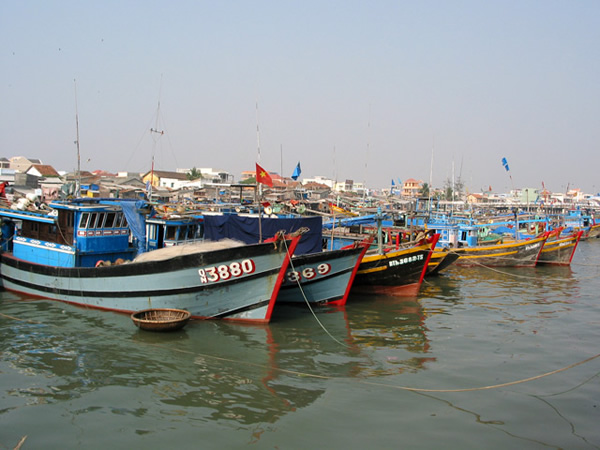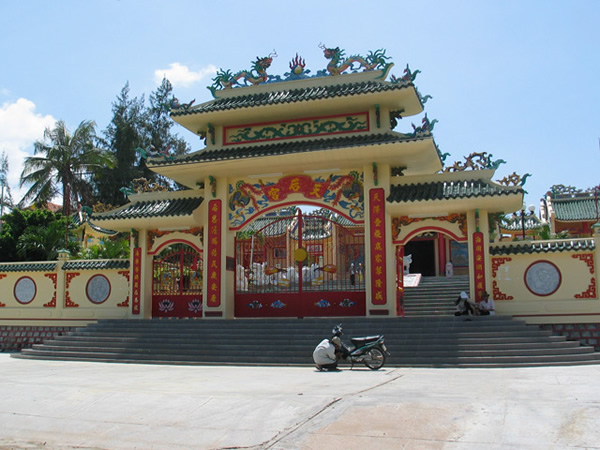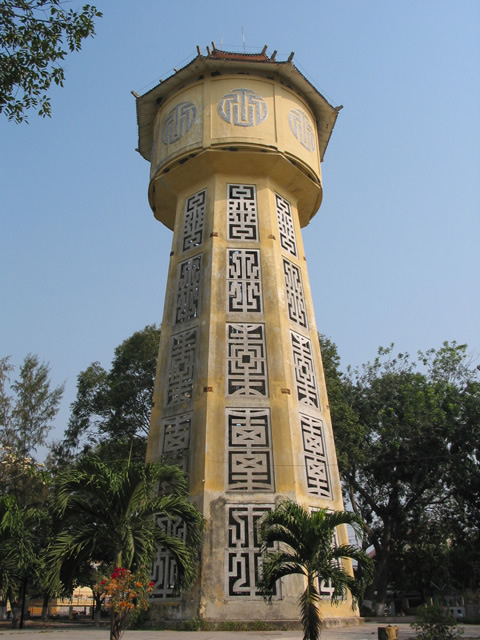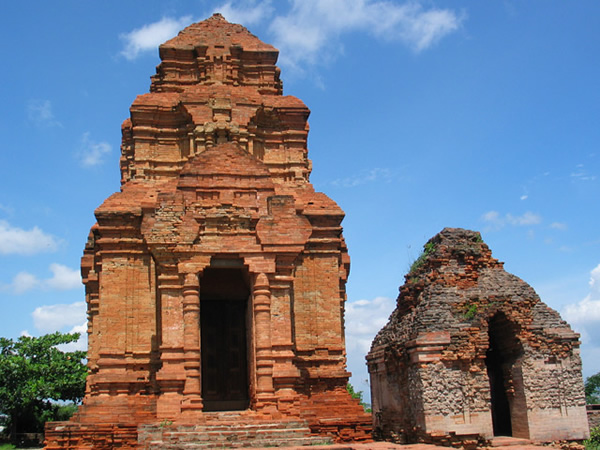Living Abroad in Small-Town Vietnam
Article and photos by Adam Bray

|
|
Phan Thiet Harbor: Colorful wooden fishing boats in Phan Thiet harbor on the Ca Ty River.
|
I wake up to the cries of the neighbor baby intruding through the wooden window shutters. Vietnamese karaoke blares from a house down the road. A funeral procession clamors past my house on the street above. A bird swoops above me in the bedroom. It must have fallen out of the nests in the rafters. It’s 7 a.m and the neighborhood is already bustling with activity. If I don’t get up soon, the sun will bake the corrugated metal roof and the house will heat up like an oven.
I roll up the straw mat on the floor and fold my blankets. I didn’t bother with this before, but I found venomous centipedes and mice in my bedding earlier this week. The fan is already off. It’s Monday, so there’s no electricity today or tomorrow — at least during daylight hours. I go to take a shower but the cistern is empty. Without electricity I can’t pump more water from the well, but it doesn’t matter because the well went dry yesterday. Rainy season is still a couple of months away so I must compete with the neighbors to draw water from the shared well before they use it all up on their crops each morning. There’s a small vat of water on the front porch but I need to save it for my 3 cay trung ca, or “fish egg trees.” They are a common tree on every street corner, but I love them because they shade the front porch and perpetually produce deliciously magical red berries.
I hop on my motorbike, speeding down the dusty road past the cemetery and Buddhist temple on my left, and follow the estuary on my right to the provincial capitol of Phan Thiet. Breakfast is bun bo xao (sweet and sour marinated beef on rice noodles with mint and pickled vegetables) on Tuyen Quang Street for 50 cents. I’m greeted at the eatery with smiles and cheers. As the only American-born foreigner living in town, I’ve become a celebrity. I can’t go anywhere alone without being recognized and swarmed by inquisitive locals. My daily routines are frequent topics of discussion around town. It nice to be popular and never lonely, but it comes at the expense of any privacy.

|
|
Temple Near My Home: This Chinese temple was recently built outside of Phan Thiet.
|
I meet some friends at Café 16, overlooking the Ca Ty river. Vietnam is a café culture. Cafes are where crucial business deals are made, birthday parties are held, crimes are conspired, the latest American movies are screened (via pirated vcd), and groups of lazy guys just come to shoot the breeze. In the morning, most of the patrons are males. Respectable girls are at school, working at home, or buying and selling in the market. My friends and I sit for a couple of hours, chatting about nothing of particular importance (we are those lazy guys). They’re having syrupy café sua da (iced Vietnamese coffee with condensed milk, brewed in single-cup presses). I’m having a durian (the “stinky fruit”) shake. I look out over the harbor full of brightly colored wooden fishing boats, and the bridges built by the Americans stationed here during the war. The giant water tower, once built by a Laotian prince and now the city symbol, watches over the gardens across the river. I imagine that one day Phan Thiet will be a major tourism center as the Vietnamese economy continues to grow. I’m glad though that for now, I have it all to myself.

|
|
Phan Thiet Water Tower: This symbol of Phan Thiet was designed by Prince Suphanouvong of Laos.
|
It’s time to go. Protocol dictates that I pay the entire bill because I initiated the outing. The bill comes to $1.50 for four of us. After paying, I head walk down two floors of karaoke rooms to retrieve my motorbike. I drive through the center of town, heading East to Mui Ne, a beach resort strip nestled among immense red and gold sand dunes. I go there each day to work at Coco Café, which has the fastest internet (ADSL) in the entire province.
It’s 11:30 a.m. The market and shops are beginning to close for the afternoon-long siesta. It’s too hot to work comfortably in the afternoon when the sun reflects blindingly off the sea and the surrounding dunes. Lunch is often a problem for me because I have a typical country-style kitchen at home, which means no refrigeration, running water, or modern stove. I haven’t learned how to cook in a traditional clay oven with coals, so I depend largely on street food for meals. If I’m lucky, I manage to scrounge some fruit at one of the roadside stands for lunch, before they close.
I climb the hill to Mui Ne, passing ancient Cham towers on my right. The Cham are descendants of a Hindu, matriarchal empire that once controlled this part of Vietnam. Now most are Muslims, and live here in the desert of Binh Thuan and Ninh Thuan province. I pass rolling hills of Cashew orchards overlooking the sea. A bare spot on the hill marks the location where public executions by firing squad are held once a month.

|
|
Cham Towers: The ruins of three Cham Towers overlook Phan Thiet, dating from the 8th century.
|
The resort stretch of Mui Ne is less than 10 years old. A few foreigners live and work here, either as managers for foreign-owned restaurants and resorts, or as kiteboarding instructors. The constant wind and extremely low rainfall here are optimum conditions for the sport, making Mui Ne the kiteboarding capitol of Vietnam. English teaching opportunities have not yet presented themselves. While English skills are in high demand at local resorts and restaurants, incomes are still relatively low, so few prospective students can afford fees needed to support foreign teachers. Even so, local administrators have not warmed up to the idea of foreigners teaching at local schools as they do in Ho Chi Minh City and Ha Noi.
I don’t fit the common mold here, subsisting as a freelance web designer, writer, production assistant, location scout, musician — anything that requires a bilingual foreigner with creative skills. I’m not dependant upon the tourism industry like the other foreigners, and it perplexes everyone around me. Nonconformity makes people uneasy, and it can occasionally lead to innocent yet lengthy question and answer sessions with authorities.
After a productive afternoon on the internet, I drive back downtown for dinner. I stop at my favorite place for bo bit tet. Locally, this is thinly sliced, fried beef steak, eggs and pâté, eaten with baguettes, sliced tomatoes and cucumber, all under $1. I’m a regular here and their other place across town, so the older ladies that own both places tease and mother me relentlessly. They chide me about leaving my ex-girlfriend. They scold me for going out in the hot sun without a hat. It’s all good natured. I like it. This feels like home.
Afterwards, I meet my friends for trai cay dia (fruit salad) at the old railway station. It’s a nightly ritual. Ladies manning carts stacked with pungent durian, melons, dragon fruit, delicate persimmons, aromatic jackfruit, aloe, mango, and other bountiful produce, mix them in giant blenders or chop them into salads topped with hot coconut syrup, tapioca cubes, peanuts, and shredded, candied papaya. Others sell che, which comes in many forms. Some che is like chilled pudding, made with glutinous rice, beans, sugar cane and more coconut syrup. Others are more like a sweet soup, made with various combinations of tapioca pearls, stewed fruit, lotus root, lentils and white fungus. Men push carts full of cha gio (spring rolls), grilled meats, and dried squid. A single order of anything is about 25 cents. It’s a smorgasbord of some of the tastiest and healthiest fast food on the planet.
By 10:30 pm most of the city closes down. I say goodnight to my friends and make a lap over the bridge, through the empty market, along the harbor, and then back through town. Despite being late, it’s very safe out on the streets. I pass a few groups of men drinking beer and snacking on dried seafood. Further down the road the local troupe of transvestites is on the prowl for new friends.
I arrive back at home and find that the electricity back on. I flip the light switch. The kitchen lights flicker for a few minutes and then go out. I open the back door and see that the neighbors below are having a little party. There are bright lights through the trees and I hear loud Karaoke. I share the same power line with them and several other neighbors, so by the time the line reaches my house the power is often too weak to be of any use.
I sit on the back porch, overlooking the moonlit river as it winds through the rice patties and small villages in the valley. The stars blend into the tinkling lights of distant farmhouses. What do I need electricity for? If I turned the lights on, I’d miss this view. It’s not a convenient life here in Vietnam, but it’s a rich life, and I’m thankful for it.
More on Small-Town Life in Vietnam
While renting or even buying your own house (currently sold on 50-year leases to foreigners) may sound romantic, in most cases it is easier to stay in a guesthouse. Guesthouses normally have reliable utilities, maid service, and can provide meals. If you live in a house, you might have to register your passport with the police yourself on a regular basis, which can be a big hassle, especially if few foreigners live in your area.
“Street food” is a healthy, safe and cheap alternative to cooking yourself. In Phan Thiet, banh xeo (seafood pancakes), pho bo (rice noodle soup with beef), home-style by-the-plate dishes with rice, and the previous mentioned dishes are all common. Street food in Phan Thiet usually ranges from 4,000VND to 12,000VND ($0.25-$0.75) per meal.
For more on working as a freelancer in Vietnam, see “Take Your Work with You and Stay Overseas Indefinitely.”
Adam Bray is a contributing author to ThingsAsian’s guides to Cambodia and Vietnam in the popular “To Asia With Love” series.
|
